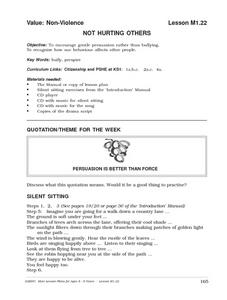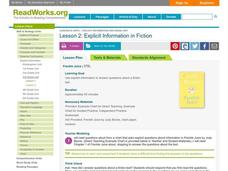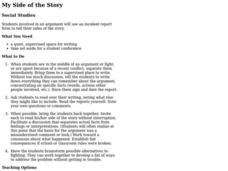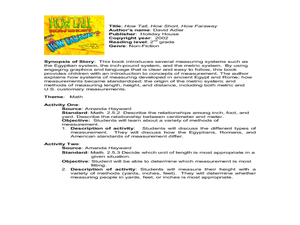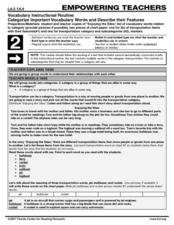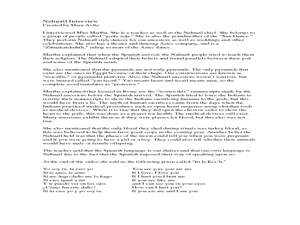Curated OER
What if Amelia Earhart had Turned Around?
Students discuss an article in USA Today in which Gregg Zoroya proposes his theory about what happened to Amelia Earhart. In this reading comprehension and Amelia Earhart lesson, students read an article in USA Today that...
Curated OER
Renaissance Realities
Students analyze passages by Niccolo Machiavelli and Francis Bacon as an analysis of Renaissance ideas in contemporary situations. In this Renaissance writings lesson, students read excerpts from Machiavelli's The Prince and multiple...
Curated OER
Self Acceptance
Students develop confidence about themselves. Students imagine they are a rubber ball and think about how strong they are inside themselves. They read a story about an elephant and a lion and reflect on questions provided. Finally,...
Curated OER
Not Hurting Others
Students are encouraged to use gentle persuation rather than bullying and recognize how their behavior affects others. Students reflect to themselves with provided questions, read a story and reflect about how the characters acted, and...
Curated OER
Writing Business Letters of Request
Tenth graders model proper format and elements of business letters. They review effective writing styles and write a request letter. Students also read a short story that includes conflict irony and symbolism They create a chart...
Curated OER
Explicit Information in Fiction
Third graders read the story Freckle Juice and answer short answer questions by providing explicit information. In this explicit information worksheet, 3rd graders do this for chapters 3, 4, and 5.
Curated OER
A Very Short History of the English Language
Students apply their knowledge of world history to research major influences on the language that has become the English we speak today; develop timeline of events in Britain and explain contributions of various invading groups to the...
Curated OER
How Tall, How Short, How Faraway
Second graders determine the correct unit of measure to use for different situations. In this measuring instructional activity, 2nd graders are introduced to different unit of measure. Students study the origin of measurement and...
Curated OER
Edgar Allan Poe's "The Cask of Amontillado"
After reading "The Cask of Amontillado" by Edgar Allan Poe, use the SMART board file to learn about Poe's background and use of irony. The activity includes resource links to additional websites, as well as the SMART board file (you...
Curated OER
Comparison and Contrast - D. H. Lawrence
Read The Horse Dealer's Daughter and The Rocking Horse Winner by D. H. Lawrence, then write an essay comparing and contrasting the two stories. Learners choose some aspect to write about, such as themes, characters, setting, or plot.
Curated OER
Zero Tolerance and Toy Guns
Seventh graders write a short reaction to the "Zero Tolerance" policy in regards to students and play guns. They read several news articles about the problems associated with the zero tolerance and students with play guns. They write a...
Curated OER
Literary Analysis of Theme
Remember reading "The Lottery" and "The Possibility of Evil" by Shirley Jackson? Learners can experience and analyze the tension, themes, and human experience found in these pieces through reading and class discussion. They use...
Curated OER
Unicorns, Dragons, and Other Magical Creatures
Young scholars exoplore the world of imaginary creatures (dragons, unicorns, etc.) They discuss the creature's special attributes and read stories about them. They create their own magical creatures in the form of puppets.
Curated OER
Literary Analysis of The Minister's Black Veil
After reading The Minister's Black Veil, by Nathaniel Hawthorne as a homework assignment your class will complete a literary analysis. Learners will analyze important element of the story and take notes to help support their...
Curated OER
Categorize Important Vocabulary Words and Describe their Features
Second graders read a short passage along with the teacher to pull out various transportation related words. They analyze each of the chosen words by creating a chart which helps them think about the similarities and differences of each...
Curated OER
The Catcher in the Rye: Found Poem Activity
After concluding The Catcher in the Rye class members create a found poem using words drawn from J.D. Salinger’s “Both Parties Concerned.” The story, and directions for crafting a found poem, are included with the resource.
Curated OER
Nahuatl Culture
Students read stories, look at maps, and write journal entries to learn about the language and artwork of Nahuatl culture. In this Nahuatl culture lesson plan, students research the Nahuatl culture and present their findings.
Curated OER
Storytelling Model
Students examine how to model story telling for their classes. They investigate how to learn, rehearse and share stories.
Curated OER
Crane, London, and Literary Naturalism
Students read London's "To Build a Fire" and Crane's "The Open Boat" and compare and contrast the authors' style as they explore the genre known as American literary naturalism.
Curated OER
Classroom Potlatch
Elementary schoolers study the history and purpose of potlatches. The listen to two stories about potlatches, then design a potlatch that they will host for their family members. They must come up with the gifts they would give, the...
Curated OER
Character Traits
Sixth graders explore details from a story to develop ideas and opinions about character traits. Using a Smart Board, 6th graders create a chart explaining the character's action and traits. In groups, students discuss and describe...
Curated OER
How the Kangaroo Got Its Pouch
Students perform a play based on a legend. In this performing arts lesson, students read the legend Kangaroo Gets a Pouch and brainstorm ways to turn the story into a play. Students prepare for a short play, including costumes and...
Curated OER
Prince Ibrahima
Sixth graders read and utilize the facts from the story "Abd al-Rahmen Ibrahima" by Walter Dean Myers to analyze the main character's life which is ruined by conflict, jealousy, and greed. Journal entries are created in response to the...





